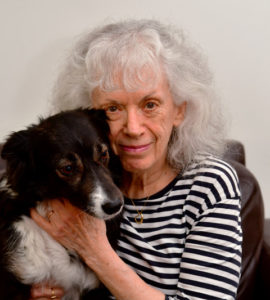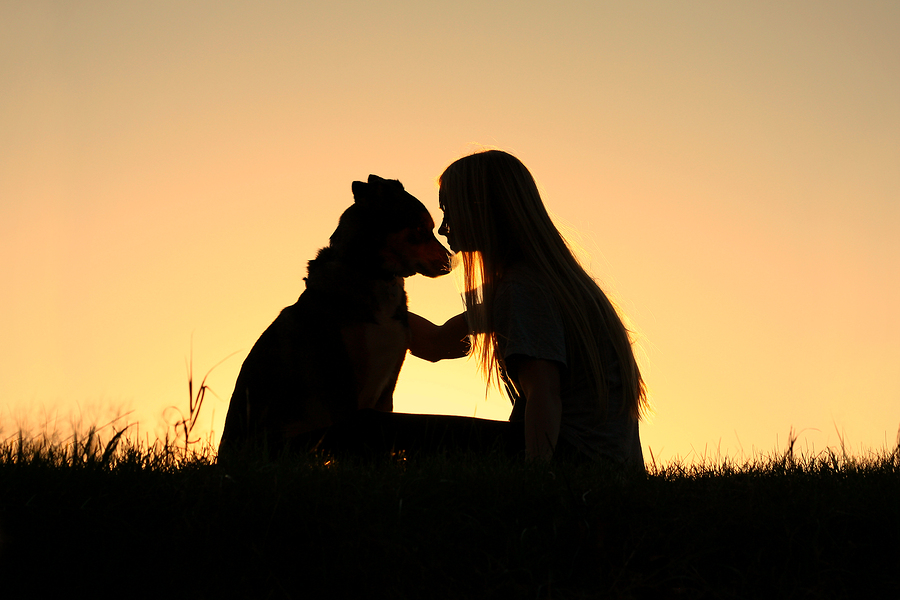When the worst thing you can think of happens, when there’s a death in the family, some of the most important help you and your dog can get is from each other. Not surprisingly, it might be the dog’s issues that alert you to the depth of your own, because you might be too frantic, too busy, and too full of grief to recognize just how stressed and sad you actually are. Not only that, we humans are masters at protecting ourselves during terrible times by feeling numb, but seeing your dog hide under the bed, paw you for reassurance, pick at her food, or whine for no obvious reason might be like looking in the mirror, might be a way for you to understand that both of you are feeling the loss and that you need each other now more than you ever have before.
Comforting Each Other

When there’s a lot to do and not much time to care for yourself or worry about your dog, a quiet little schmooze can help. Find a place to be alone together, call your dog up next to you, and if your dog generally like to be petted, gently stroke her back, her ears, her neck. Then with the tips of your fingers, massage the top of her head, first one side, then the other. Now put a finger in the V shape made by the bones on top of her head. This is the endorphin spot. Putting a slight pressure there will help both of you to release endorphins, which lower pain.
Petting your dog and talking to her will also release oxytocin in both of you. Oxytocin is the feel-good hormone released when mothers of any species hold their infants, and it also floods you and your dog when the two of you cuddle. Take a moment and ask your dog to lie down against your side. The warmth and pressure of her body will be calming, and after five or 10 quiet minutes therapeutically glued together, you will both feel better.
When it’s time for a walk, some dog and human friends will prefer quiet, a walk without socializing, time to breathe deeply, and let some of the worries go. Some days, you and your dog might prefer a more distracting outing, a walk in the park where you might run into both dog and human companions. This is a time to understand that whatever works for you — quiet time, playing ball with your dog, or talking to a stranger in the park — is the thing to do.
Recognizing Canine Feelings
It’s not hard for a dog to feel her feelings. Dogs live in the present and whatever the present offers them is what they feel. For us, it can be more complicated, and we are handy at finding escape hatches. Some escape is good, especially the kind you do on purpose. Some may not be so good, ignoring everything around you because it makes you hurt too much. Remember to check the mirror — your dog. She is probably feeling much of what you are, not worries about money or fear of being alone, but feelings of sadness, of missing the person who is gone. Suddenly the family is smaller. In some cases, it’s now just the two of you. There’s no one to play with because you’re too sad, and there’s no way to shed the grief. Plus, she’s feeling more complicated things she can’t understand — your fear, your loneliness, your confusion, and the endless worry that fills your home.
When you take the time to focus on your dog, it will put you in touch again. Is she eating? Are you? Is she getting more than time alone in the yard or a five-minute walk? Are you getting out? A walk can give you the energy to do all the difficult things you have to do at a time when you want to do nothing at all. A walk will help you breathe, will help your circulation, will, no matter how bad you feel, make you feel a little bit better. A walk will show your dog that life will go on, that you and she are still a team, and that many of the routines she counts on, routines that comfort both of you, will continue. She will help keep you in touch and be at your side when you need a break. Her mealtimes will remind you to eat and her warm, attentive presence, the fact that she’s there to offer comfort and love, might be exactly what you need to help you through.
In times of terrible grief, your dog really is your best friend.
This article was reviewed/edited by board-certified veterinary behaviorist Dr. Kenneth Martin and/or veterinary technician specialist in behavior Debbie Martin, LVT.
Carol Lea Benjamin is a noted dog trainer, who, in 2002, was elected to The International Association of Canine Professionals Hall of Fame for “a lifetime of dedication to dogs and their training.” She is the author of numerous award-winning books on dog behavior as well as the Shamus Award-winning Rachel Alexander and Dash mystery series. Benjamin lives in New York City with her two dogs, Sky, a Border Collie, and Ziggy, an English Shepherd.








